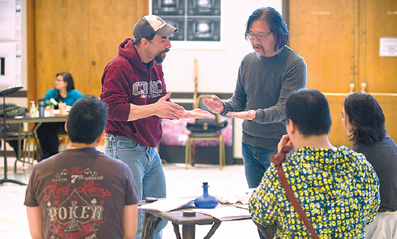 |
|
Stan Lai works with the cast at the rehearsal of Secret Love in Peach Blossom Land. Photo provided to China Daily |
Like Ang Lee, Lai embodies the perfect synthesis of the East and the West, simultaneously immersed in both cultures and creating works that are Chinese to the core yet possessing "legs to travel across the globe", to borrow a Hollywood term. For the US production of Secret Love, Lai sets the story in the Bowmer Theater where the play is performed, but retains the context of the two plays within the play.
He added many lines to inform the local audience of what happened in China in 1949, a requirement to understand the "secret love" part of the story. The notion of "peach blossom land" is eerily reminiscent of Utopia or Shangri-La and it didn't seem to matter if nobody in the audience ever heard of Tao Yuanming. Local media reported that the opening show was attended by many Asians, but none of them appeared to catch the humor easily.
Some of the comedy still worked, Lai reveals, but he had to adapt or delete other parts from the script.
Reviewer Angela Decker wrote in the Mail Tribune that Lai "peppers it with Ashland in-jokes, and simultaneously embraces and pokes fun at the festival's commitment to multiracial casting. For the most part, the play translates extremely well..."
This is what Rauch liked about the play and Lai's direction in the first place, "that it is set in whatever theater it was being produced". Changes are made to "have the play make sense in an American context", which includes OSF's multiracial cast that includes five Asian-American actors. "It's been beautiful to watch Stan find ways to make the play clearer to an American audience, ... but also making sure that he didn't compromise the integrity of his story. He's done it in a very artful way."
Regarding the cultural balance in presenting a foreign work, Rauch says he wants the audience to "feel the differences in our cultures in as many ways as possible, but ultimately to be moved by our shared humanity." On his part, Lai brought in a Peking Opera specialist to train actors as percussionists, so as to make a lot of "noises". He made many directorial choices that push the play to new modes of expression, earlier untried in China, he says.